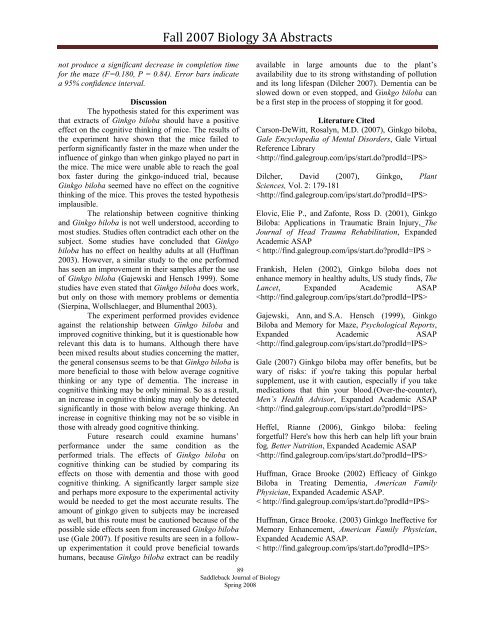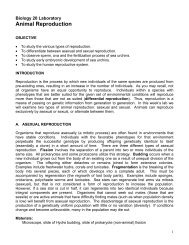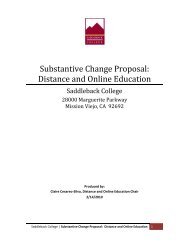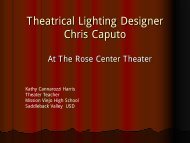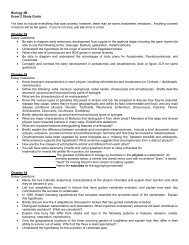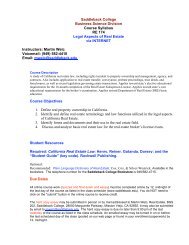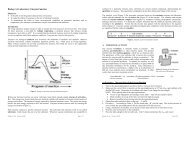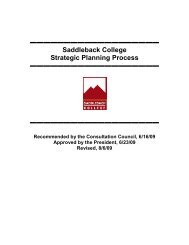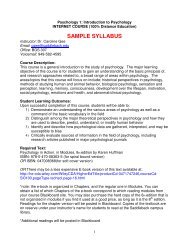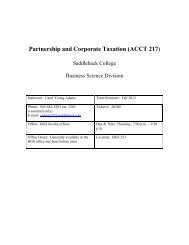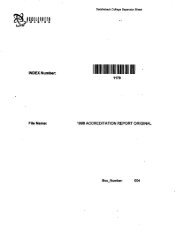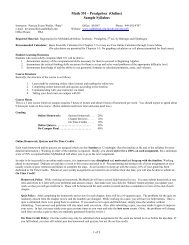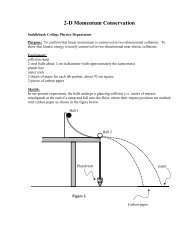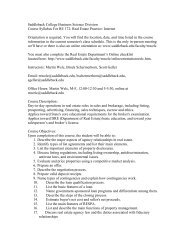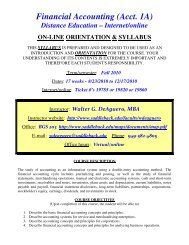Volume 6, Spring 2008 - Saddleback College
Volume 6, Spring 2008 - Saddleback College
Volume 6, Spring 2008 - Saddleback College
Create successful ePaper yourself
Turn your PDF publications into a flip-book with our unique Google optimized e-Paper software.
Fall 2007 Biology 3A Abstracts<br />
not produce a significant decrease in completion time<br />
for the maze (F=0.180, P = 0.84). Error bars indicate<br />
a 95% confidence interval.<br />
Discussion<br />
The hypothesis stated for this experiment was<br />
that extracts of Ginkgo biloba should have a positive<br />
effect on the cognitive thinking of mice. The results of<br />
the experiment have shown that the mice failed to<br />
perform significantly faster in the maze when under the<br />
influence of ginkgo than when ginkgo played no part in<br />
the mice. The mice were unable able to reach the goal<br />
box faster during the ginkgo-induced trial, because<br />
Ginkgo biloba seemed have no effect on the cognitive<br />
thinking of the mice. This proves the tested hypothesis<br />
implausible.<br />
The relationship between cognitive thinking<br />
and Ginkgo biloba is not well understood, according to<br />
most studies. Studies often contradict each other on the<br />
subject. Some studies have concluded that Ginkgo<br />
biloba has no effect on healthy adults at all (Huffman<br />
2003). However, a similar study to the one performed<br />
has seen an improvement in their samples after the use<br />
of Ginkgo biloba (Gajewski and Hensch 1999). Some<br />
studies have even stated that Ginkgo biloba does work,<br />
but only on those with memory problems or dementia<br />
(Sierpina, Wollschlaeger, and Blumenthal 2003).<br />
The experiment performed provides evidence<br />
against the relationship between Ginkgo biloba and<br />
improved cognitive thinking, but it is questionable how<br />
relevant this data is to humans. Although there have<br />
been mixed results about studies concerning the matter,<br />
the general consensus seems to be that Ginkgo biloba is<br />
more beneficial to those with below average cognitive<br />
thinking or any type of dementia. The increase in<br />
cognitive thinking may be only minimal. So as a result,<br />
an increase in cognitive thinking may only be detected<br />
significantly in those with below average thinking. An<br />
increase in cognitive thinking may not be so visible in<br />
those with already good cognitive thinking.<br />
Future research could examine humans’<br />
performance under the same condition as the<br />
performed trials. The effects of Ginkgo biloba on<br />
cognitive thinking can be studied by comparing its<br />
effects on those with dementia and those with good<br />
cognitive thinking. A significantly larger sample size<br />
and perhaps more exposure to the experimental activity<br />
would be needed to get the most accurate results. The<br />
amount of ginkgo given to subjects may be increased<br />
as well, but this route must be cautioned because of the<br />
possible side effects seen from increased Ginkgo biloba<br />
use (Gale 2007). If positive results are seen in a followup<br />
experimentation it could prove beneficial towards<br />
humans, because Ginkgo biloba extract can be readily<br />
89<br />
<strong>Saddleback</strong> Journal of Biology<br />
<strong>Spring</strong> <strong>2008</strong><br />
available in large amounts due to the plant’s<br />
availability due to its strong withstanding of pollution<br />
and its long lifespan (Dilcher 2007). Dementia can be<br />
slowed down or even stopped, and Ginkgo biloba can<br />
be a first step in the process of stopping it for good.<br />
Literature Cited<br />
Carson-DeWitt, Rosalyn, M.D. (2007), Ginkgo biloba,<br />
Gale Encyclopedia of Mental Disorders, Gale Virtual<br />
Reference Library<br />
<br />
Dilcher, David (2007), Ginkgo, Plant<br />
Sciences, Vol. 2: 179-181<br />
<br />
Elovic, Elie P., and Zafonte, Ross D. (2001), Ginkgo<br />
Biloba: Applications in Traumatic Brain Injury, The<br />
Journal of Head Trauma Rehabilitation, Expanded<br />
Academic ASAP<br />
< http://find.galegroup.com/ips/start.do?prodId=IPS ><br />
Frankish, Helen (2002), Ginkgo biloba does not<br />
enhance memory in healthy adults, US study finds, The<br />
Lancet, Expanded Academic ASAP<br />
<br />
Gajewski, Ann, and S.A. Hensch (1999), Ginkgo<br />
Biloba and Memory for Maze, Psychological Reports,<br />
Expanded Academic ASAP<br />
<br />
Gale (2007) Ginkgo biloba may offer benefits, but be<br />
wary of risks: if you're taking this popular herbal<br />
supplement, use it with caution, especially if you take<br />
medications that thin your blood.(Over-the-counter),<br />
Men’s Health Advisor, Expanded Academic ASAP<br />
<br />
Heffel, Rianne (2006), Ginkgo biloba: feeling<br />
forgetful? Here's how this herb can help lift your brain<br />
fog, Better Nutrition, Expanded Academic ASAP<br />
<br />
Huffman, Grace Brooke (2002) Efficacy of Ginkgo<br />
Biloba in Treating Dementia, American Family<br />
Physician, Expanded Academic ASAP.<br />
< http://find.galegroup.com/ips/start.do?prodId=IPS><br />
Huffman, Grace Brooke. (2003) Ginkgo Ineffective for<br />
Memory Enhancement, American Family Physician,<br />
Expanded Academic ASAP.<br />
< http://find.galegroup.com/ips/start.do?prodId=IPS>


